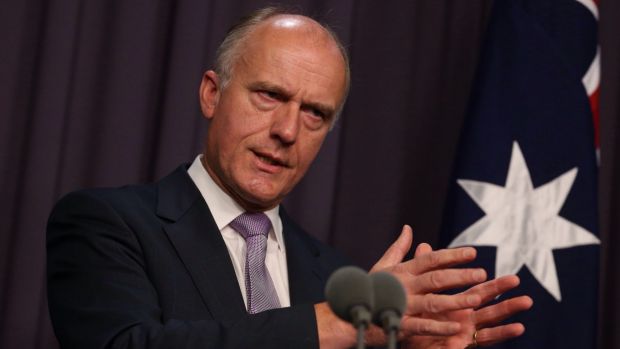The Coalition’s climate denial brigade should join the rest of the electorate and move on.

Senator Eric Abetz. PHOTO Andrew Meares, Sydney Morning Herald
“Why did we not run on the carbon tax?” asked Tasmania’s senior Liberal senator, Eric Abetz, in an ABC radio interview last week.
It’s an interesting question. I’ll throw in a couple more: Why did the Coalition say so little about climate policy during the campaign, and why is Nationals leader Barnaby Joyce, a long-time climate sceptic, now admitting that man-made climate change is real?
Clearly angry that his party’s campaign style was so different from that of his former (and preferred) leader Tony Abbott, Abetz raised doubts as to whether the Liberals could claim a win.
On the face of it, the close election might seem to strengthen the hand of conservative ideologues in the Coalition like Abetz, Cory Bernadi from South Australia and George Christensen from Queensland. For these, opposing strong emissions action has become an article of faith.
For a decade or more, as a steady stream of scientific data continues to strengthen the case for urgent action, holdouts in the Coalition have fed colleagues with their own steady stream of contrarian propaganda, funded in large part by US-based fossil-fuel interests.
The global campaign of denial isn’t going away soon, but all Liberal MPs know Malcolm Turnbull’s convictions about climate change. They know that while he’s leader, taking a contrary position could affect their careers.
There are tiny hints that growing numbers of Coalition MPs have grasped that this policy issue will only get bigger and more pressing as time passes and are beginning to shift ground.
The renewable energy industry has had to endure years of turbulence caused by changing policy, but that’s just part of the story. The energy industry as a whole now accepts that household solar and other disruptive renewables are here to stay, and is pushing for market reform.
The Coalition didn’t discuss climate policy during the election campaign, so no-one really knows what the government’s planning. More uncertainty, as if we needed it.
Business doesn’t care for ideology, especially where it stands in the way of making money for shareholders. Past ideological obstacles have tended to be thrown up by the left of politics, in the form of socialism and environmentalism. Now they’re coming from the right.
The Coalition has found it easy to ignore activist campaigns because it identifies them with left-wing politics. It’s still possible, though less so, for it to ignore moves by cities and towns and cooperative groups to develop low-emission strategies.
But for months now the Business Council of Australia has been calling for bipartisan climate measures, and that’s a group the Coalition can’t ignore.
There are other incentives for the Coalition to pursue stronger climate measures. The 2030 emissions target it committed to under Abbott isn’t much, but even so it won’t be easy to reach.
Ironically, one of its key tools will be a carbon price – not as we know it from the scheme Abbott axed, but a price nonetheless. With Labor and Green support it was legislated into law last December, and came into effect the day before the election.
The government’s safeguard mechanism requires 150 of Australia’s highest-emitting companies to cap emissions at their peak level over recent years. If they go under this amount they will win credit units, and if they go above they will have to buy enough units to cover their excess.
This scheme is far from a fully-fledged cap-and-trade scheme. It won’t raise revenue, and at least at the outset won’t be as effective in hitting emissions. But it’s cause for optimism that the party divide over climate will actually diminish in this term of office.
Who knows, we may be at the start of a new era of bipartisan climate policy. And if bipartisanship can deliver investment stability to the energy industry while fostering uptake of renewables, the Coalition diehards on the right will find themselves fighting shadows.
So there you have it, Senator Abetz. Your party opted not to run on axing the carbon tax because focus groups showed it wasn’t a goer. People have moved on, and you should too.
